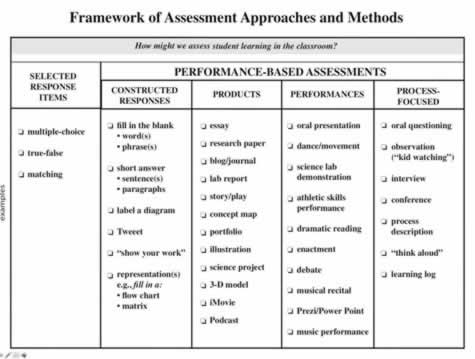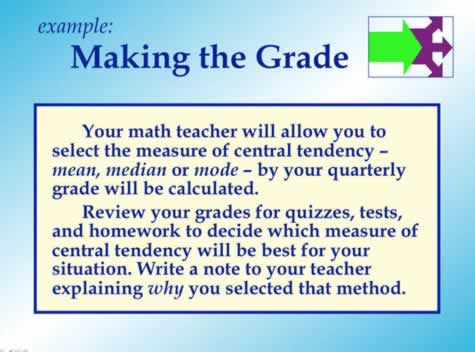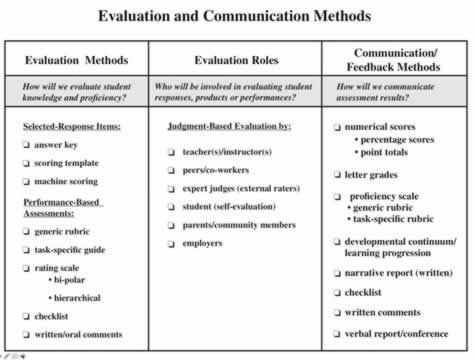Here’s how to create new formative assessments to measure complex student comprehension
 The rigors of the Common Core State Standards (CCSS) ask today’s educators not simply to measure students’ factual knowledge, but instead to accurately assess students’ critical thinking. With such a major transition from multiple-choice testing, it’s important to know how to create assessments for these 21st-century standards.
The rigors of the Common Core State Standards (CCSS) ask today’s educators not simply to measure students’ factual knowledge, but instead to accurately assess students’ critical thinking. With such a major transition from multiple-choice testing, it’s important to know how to create assessments for these 21st-century standards.
“The most important question to ask at the onset of assessment creation is: How might we develop and use rich tasks to focus on those outcomes that matter most, and make school more relevant and engaging for learners and teachers?” explained Jay McTighe, consultant and author of the new Lumibook, Core Learning: Assessing What Matters Most, during a webinar hosted by the School Improvement Network.
McTighe emphasized that the aim of the new standards is autonomous transfer, or student comprehension and understanding of concepts, rather than facts.
“Many of the standards are broad and can be applied to multiple subjects, and this is because the standards are meant to teach students the processes of critical thinking as it relates to what they’re learning. I like to see this as a focus on standards of practice: habits of mind and the processes of work,” he noted.
(Next page: Is there a “best” kind of assessment?)
Is there a ‘best’ assessment?
An important mindset to remember, explained McTighe, is that there’s no single best measure, because “every measure has a flaw. There’s no one measure that can accurately assess a student’s deep level of knowledge.”
Instead, McTighe described that a good assessment has multiple measures included to limit the number of flaws within each individual measure, leading to a more accurate assessment.
“Sound assessments require multiple sources of evidence, collected over time. Think of mediocre assessments as a photo snapshot, which shows a moment in time. Good assessments are an album, or a video, which reveals an entire process,” said McTighe.
For McTighe, there are many possible assessment approaches and methods, and though no one method is perfect, process-focused assessments, which incorporate features such as oral questioning, observation, learning logs, and more, are preferable.
“Primary grade teachers, who apply many of these features into the classroom, are usually the most skilled at implementing and understanding the outcomes of process-focused assessments,” he said. “It’s time educators in higher grade levels began incorporating these features more heavily in their own classrooms.”
McTighe emphasized that assessments that measure these student performance tasks should be based on a curriculum geared towards critical thinking.
“A good idea, too, is to let the students know the tasks they are about to perform and why it’s important they develop these skills,” he noted. “This can help students focus and consolidate their learning, which makes for better performance on their assessments.”
McTighe mentioned the Literacy Design Collaborative http://www.ldc.org/ that provides performance task templates teachers can use when developing assessments. For example, a template for English/Language Arts can read:
“After reading ___ (literature of informational text), write ___ (essay or substitute) that compares ___ (content) and argues ___ (content). Be sure to support your position with evidence from the texts.”
(Next page: Authentic questions and advice to remember)
Another good idea when developing assessment questions is to make them “authentic to not just the world, but to the students, as well,” said McTighe.
One example can be seen in this question developed for mathematics:
One rubric, developed by McTighe, can help with developing process-focused questions, as it reminds teachers to develop multiple evaluation and communication methods:
Advice to remember
“Something I always tell educators to remember are the three stages of universal backward design (ubd),” noted McTighe, “and those are: 1. Identify desired results; 2. Determine acceptable evidence; and 3. Plan learning experiences and instruction.”
One way to test your assessment is to measure the desired results by creating a ubd planning template, he said. To create the template, outline the goal of the assessment and on a separate piece of paper outline the performance tasks student will complete to reach the goal of the assessment.
Next, mix up the pieces of paper with the performance tasks and try to identify the goal of the tasks simply by reading the tasks.
“If you can’t identify which goal the tasks are trying to accomplish, the tasks are not appropriate and the assessment probably won’t work,” said McTighe. “This is called checking your assessment alignment.”
Another piece of advice from McTighe is for teachers to list only the concepts they plan to directly teach and assess.
“Don’t list all the possible outcomes and all the possible assessments. Keep your goals focused and the assessments will be easier and the desired outcome more attainable.”
McTighe concluded by recognizing that not every assessment can be as complex and time-consuming as teachers would like, due to various concerns, such as preparing for state tests and meeting AYP demands.
“You definitely can’t ignore these concerns; however, practice tests shouldn’t always be multiple-choice all the time,” he said. “They should be more performance-based. And if you need a reason to spend time on these kinds of formative tests, just think: Most of the questions students end up getting wrong on standardized tests are comprehension-based/process-based and ask students to solve complex problems.”
He continued, “Developing process-based formative assessments now will help meet those school and state demands in the future.”
- #4: 25 education trends for 2018 - December 26, 2018
- Video of the Week: Dealing with digital distraction in the classroom - February 23, 2018
- Secrets from the library lines: 5 ways schools can boost digital engagement - January 2, 2018



